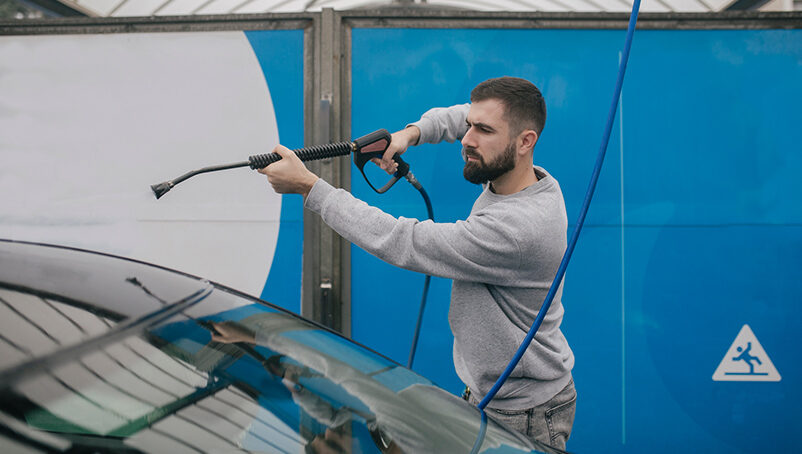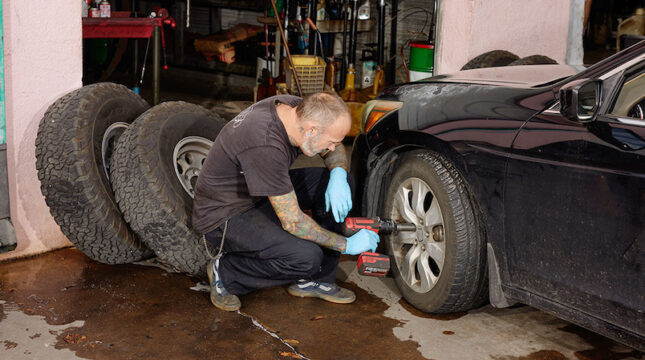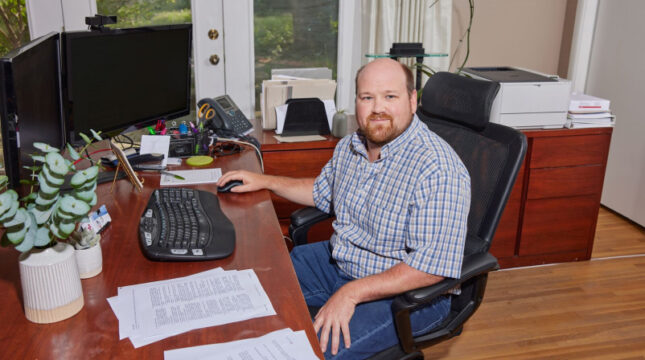Many business owners set up car washing businesses to generate passive income, while others prefer a more hands-on approach. Whether you're interested in a set-it-and-forget-it or full-service model, there are some things to consider before opening a car wash business.
Quick links
Types of car washes
Choosing a business structure
Choose a location
Develop a business and marketing plan
Licensing and permits
Purchase insurance
Types of car washes you can open
If you're serious about opening a car wash business, it's worth taking the time to do your homework to figure out what type will be a good fit for you. There are several different kinds of car washes to choose from, and it's important to understand how each of them works before making your decision.
- Self-serve. Self-service car washes let your customers clean their own cars using your equipment and cleaning solution. Since the customers do most of the work, you don't need to hire a large staff.
- Express. These drive-thru car washes are the fastest-growing type today. Express car washes use machinery to pull vehicles through a tunnel where the car gets washed and dried. Some also have self-service vacuums customers can use to clean their car's interior. Nearly every aspect of an express car wash, from payment to drying, is automated, so you can operate it with minimal to no staff.
- Attended. Attended car washes require a full staff. Instead of being pulled through a tunnel and cleaned by machines, employees clean and dry customer vehicles.
- Additional services. Will you stick with a basic car wash, or will you offer other services, such as waxing and interior detailing?
- Car wash franchise. Becoming a franchisee can help lend instant credibility to your business with a well-known name and recognizable brand — like McDonald's or Dunkin Donuts. Franchisors often provide additional support and training to franchisees, which can help shorten your learning curve when you’re getting started. But you'll have to pay a franchise fee, which typically runs from $20,000 to $50,000, according to the Small Business Administration.
Choosing a business structure
Before opening a car wash, you'll need to decide on a business structure. There are several to choose from.
- Sole proprietorship. This is the simplest and quickest way to set up a business, but your personal assets could be at risk if someone files a lawsuit against you.
- Limited Liability Corporation (LLC). This business structure separates your personal and business assets and limits your personal legal responsibility. However, you have to pay a registration fee to set up an LLC and an annual filing fee.
- S-Corporation (S-Corp). Depending on how much you earn from your car washing business, an S-Corp may have tax advantages. However, there are restrictions on how you may pay yourself as the business owner.
- Partnership. Going into business with your college roommate or best friend from elementary school? When you set up a partnership, all partners have a stake in the company, sharing the profits and the losses.
The way you structure your business will have tax and legal implications. It may be worth having a conversation with a tax professional and attorney before you decide how you’ll set up your business.
Choose a location to open your car wash
Opening a car wash on a country road with more cows than cars probably won't lead to a profitable business. Choosing the right location for your business is key. When selecting a space, look for a high-traffic area with lots of cars driving by regularly.
Don't forget to check out the local competition. Find out how many customers they have, how much they charge and what type of marketing they do to promote their business. Make sure there's enough demand in the location you choose to support your new business.
Develop a business and marketing plan
Starting a car wash business is exciting, and you may want to jump in with both feet as soon as possible. But taking some time to create a business plan can help you think through how you want to operate your business before you start taking action — and it may help you avoid unnecessary mistakes.
A business plan provides an overview of how you'll launch your business and keep it running beyond the start-up phase. It includes a summary of your target market, the services you plan to provide, your business structure, a market analysis and financial projections.
It should also include a marketing plan for promoting your business when you’re ready to welcome customers through your doors. If you're going to apply for financing from private investors, a bank, or if you're going to apply for a SBA loan, they will want to see your business plan before deciding whether to lend to you.
Licensing and permits for starting a car wash
To operate your business legally, it's important to obtain the necessary licenses and permits before you open a car wash. Each state and local jurisdiction has its own requirements, so find out what's required in your area. Here are a few common items you're likely to need.
- General business license. Nearly every business needs a business license to operate legally in the United States.
- Occupancy permit. An occupancy permit shows that the building meets zoning requirements and is safe for employees and customers.
- Federal tax ID. Also known as an employer identification number (EIN), you'll need one to pay your taxes if your business structure is anything other than a sole proprietorship. You can get an EIN for free from the IRS.
- Environmental permits. Wastewater from car washes contains pollutants that can negatively impact the environment. The water must be treated and reused or disposed of properly to minimize environmental impact. To find out what type of environmental permits you need, check with your local EPA and OSHA offices to learn more.
Purchase insurance
What happens when your automatic car washing machine malfunctions and scratches the paint on your customer’s brand-new car? Or a customer slips on the wet pavement while vacuuming the interior of the vehicle and breaks their arm?
Without insurance, you could be on the hook for covering the damage and paying for medical expenses out of pocket, but business insurance can help protect you from these and other unexpected scenarios. Here’s how.
- General liability. General liability helps protect you from many common risks that all businesses face, including injuries to people who don't work for you and property damage. It can also help pay your legal bills and court fees if someone sues you and you need to defend yourself in court.
- Garagekeeper liability. You add on this type of coverage to your general liability policy. It covers damage to vehicles you don’t own that are in your possession, such as your customers’ vehicles.
- Commercial property. This type of insurance pays to replace the equipment and supplies you need to run your car washing business if they're stolen, damaged or malfunctioning. It can also replace your income if you need to temporarily suspend your business operations due to a covered event.
- Workers’ compensation. Most states require businesses with one or more employees to have workers’ comp insurance. If you opt for a self-service or express car wash model, you may not need workers’ comp. But if you have a full-service operation, you'll need this type of coverage.
How NEXT Insurance protects car washing businesses
At NEXT Insurance, it's easy to get the coverage you need. Our customizable car wash insurance packages provide just the right amount of coverage for your business.
With our online application, you can get a quote, see policy options and purchase coverage, all in less than 10 minutes. As soon as you make your payment, you'll receive instant access to your certificate of insurance.
If you have questions during the process, our licensed, U.S.-based insurance professionals are available to help.
Get started with your free quote today.






